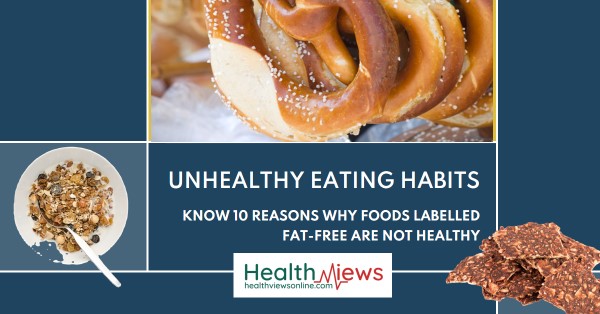According to the American Cancer Society, foods labelled fat-free indicates that it contains less than 0.5 grams of fat per serving. However, it’s important to understand that “fat-free” doesn’t mean the product is free of calories or devoid of other potentially less healthy ingredients. Here are 10 reasons why fat-free foods and food products may not be as healthy as they seem:
Foods Labelled Fat-Free May Have High Sugar Content:
To compensate for the lack of fat, manufacturers often add extra sugar to enhance flavor, texture, and palatability. For instance, fat-free flavored yogurt can contain significantly more sugar than its full-fat counterpart. High sugar intake is associated with various health issues, including obesity, type 2 diabetes, and heart disease.
Also Read: Big Warning! You are Eating Sugar Even in Non-Sweet Food Products
Artificial Ingredients and Increased Processed Ingredients:
Fat-free products often contain artificial additives, flavors, and preservatives to compensate for the lack of fat and enhance taste. For example, fat-free salad dressings may contain emulsifiers and stabilizers to maintain texture without fat. Some of these additives may have negative health effects, such as gastrointestinal issues or allergic reactions.
Also Read: All You Need to Know about Food Emulsifier Polysorbates
Increased Caloric Content and Unsustainable Weight Loss
While fat-free foods may contain less fat, they can sometimes be higher in calories than their full-fat counterparts due to added sugars and other fillers. This may not support sustainable weight loss due to their high sugar content and lower satiety. A common example is fat-free cookies, which may lead to increased cravings and overconsumption.
Lack of Satiety:
Fat plays a crucial role in providing a feeling of fullness and satisfaction after a meal. For instance, fat-free crackers may not be as filling as those containing healthy fats like whole-grain crackers with cheese. Without fat, fat-free products may not be as satiating, leading to overeating and potential weight gain.
Lower Nutrient Absorption:
Certain vitamins, such as vitamins A, D, E, and K, are fat-soluble, meaning they require fat for proper absorption. Consuming fat-free products may hinder the absorption of these essential nutrients. Yes, Fat-free products may lead to reduced absorption of these essential nutrients. An example is fat-free milk, which lacks the fat necessary for optimal absorption of vitamin D.
Also Read: Everything You Wanted To Know About Vitamin D!!!
Imbalance of Macronutrients:
Removing fat from foods often results in an imbalance of macronutrients, with an increased proportion of carbohydrates. This imbalance can impact blood sugar levels and insulin response. Fat-free granola bars are an example of a product high in carbs and low in fat, potentially leading to blood sugar spikes.
Less Flavor and Texture:
Fat contributes to the flavor, texture, and mouthfeel of foods. Without fat, fat-free products may taste bland and have a less appealing texture, leading to decreased enjoyment of meals. For example, fat-free potato chips may be less crunchy and flavorful compared to regular potato chips.
Fat-Free Foods Come With Health Risks:
In some cases, fat-free products may replace natural fats with unhealthy alternatives, such as artificial trans fats or unhealthy substitutes like highly processed vegetable oils. These fats can increase the risk of heart disease, inflammation and other health issues. Fat-free margarine is an example of a product that may contain trans fats for texture.
Watch! Fat Free Doesn’t Always Mean Healthy
Impact on Hormones:
Dietary fat plays a role in hormone regulation, including the production of hormones involved in metabolism, satiety, and mood. Consuming inadequate amounts of fat may disrupt hormonal balance and overall health.
Long-Term Health Risks of Fat-Free Food Products:
A diet high in fat-free products and low in healthy fats may increase the risk of chronic diseases, including cardiovascular disease, metabolic syndrome, and certain cancers. Research suggests that diets high in processed foods, refined carbohydrates, and added sugars – common components of fat-free products – may be associated with an increased risk of certain cancers, including colorectal cancer (Source), breast cancer, and prostate cancer.
Moreover, a person who regularly consumes fat-free cookies, crackers, and low-fat dairy products may inadvertently increase their intake of refined carbohydrates and added sugars, which can lead to elevated triglyceride levels and contribute to the development of CVD over time. Also, a person consuming fat-free salad dressings and low-fat snack bars may lead to spikes in blood sugar levels and insulin resistance, contributing to metabolic abnormalities over time.
Fat-free labels can be misleading, as they focus solely on fat content while ignoring other nutritional factors. Consumers may perceive fat-free products as healthier choices without considering their overall nutrient profile. Fat-free candy, for instance, may still be high in calories and low in nutritional value. So, it is important to consider the overall nutrient profile of foods for better health and well-being because foods labelled Fat-Free are not healthy.
Also Read: All About Vegan Diet: A Detailed Guide On Veganism For Beginners!!!





